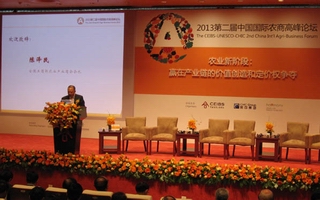 In order to keep pace with the rapid development of modern agriculture, it's imperative for China to build robust systems for production management, and food safety, and to develop highly trained, professional managers to lead Chinese agribusinesses. Hence, officials, experts and entrepreneurs in the field of agriculture got together at the 2nd China International Agri-Business Forum organized by CEIBS and UNESCO-CHIC Harmony, which was held in Beijing on May 11, 2013. Event co-organizers were the China Agriculture Industry Chamber of Commerce (CAICC) and China Good Agri-Products Development & Service Association. The theme was “Value Creation and Pricing Power along the Industrial Chain: The Key to Success in a New Era of Agricultural Development”.
In order to keep pace with the rapid development of modern agriculture, it's imperative for China to build robust systems for production management, and food safety, and to develop highly trained, professional managers to lead Chinese agribusinesses. Hence, officials, experts and entrepreneurs in the field of agriculture got together at the 2nd China International Agri-Business Forum organized by CEIBS and UNESCO-CHIC Harmony, which was held in Beijing on May 11, 2013. Event co-organizers were the China Agriculture Industry Chamber of Commerce (CAICC) and China Good Agri-Products Development & Service Association. The theme was “Value Creation and Pricing Power along the Industrial Chain: The Key to Success in a New Era of Agricultural Development”.The event began with welcome addresses by CEIBS Vice President and Dean, Hellmut Schütte and. Chen Zemin, Chairman of the China Agriculture Industry Chamber of Commerce. Dean Schütte thanked the event sponsors for their support. As he gave the audience a general introduction to the speakers and program of the day, he explained that applying business and management principles to the agriculture sector is a relatively new phenomenon in China, and thus learning platforms such as today's forum were an important tool to assist in the development and modernization of the sector.
In his welcome address, Mr Chen Zemin underscored the importance of providing education and knowledge transfer to all involved in the agri-business sector. China's agricultural development lags far behind that of other countries, Mr Chen said. In order for China's agriculture industry to compete on a global scale, reforms and modernization are urgently needed, he added.
Mr Huang Qifan, Deputy Secretary of the CPC Chongqing Municipal Committee, Mayor of Chongqing Municipality and CEIBS EMBA 1998 was the day's first keynote speaker. Using trial reforms being implemented in Chongqing as a reference point, he discussed the long-term challenges China faces in its efforts to bring about urban/rural integration. Hukou reform, labor shortages, social services and financial services were among the issues he discussed.
The second keynote speaker was Mr Zhu Baocheng, Member of the Party Leadership Group, China's Ministry of Agriculture. He is also Head of the Discipline Inspection Group in China's Ministry of Agriculture, and Chairman, China Good Agri-Products Development and Service Association (CGAPA). He spoke about the importance of brand building in developing China's agriculture sector. Stronger brands will help increase domestic consumption and will also enhance the competitiveness of Chinese products in the global market, he said.
China's role in the global agricultural industry was the topic explored by Mr Yu Xubo, Director and President of COFCO Corporation and CEIBS EMBA 2002. He said that COFCO is working to incorporate small farmers into the COFCO industrial chain. As China's agricultural sector develops, it will need to benchmark itself against other countries, he noted.
Mr Edward Y.M. Zhu, CEO, CHIC Group and CEIBS EMBA 2006 gave the final keynote speech of the morning. He made the point that education is the key to modernizing China's agriculture sector and that China's agricultural education systems must be improved in order to address the serious shortage of agribusiness talents. In his view, the goal of this process is to improve the living standards of farmers and rural workers, which will, in turn, help to develop agribusinesses.
Urbanizing the farmers will also require developing a service industry and a system for high-quality vocational programs in rural areas, and treating agricultural work in a more professional and respectful manner.





